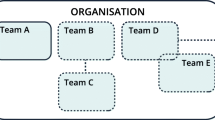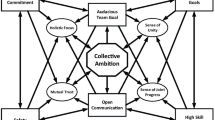Abstract
Recent strides in computing and telecommunications have provided managers with access to ever increasing amounts of data through higher speed computers and extensive connectivity. However, these advances have not solved the problems of getting the right information to the right person at the right time, and retaining that information in the organization for future use. This paper addresses the issues of information sharing, information overload, and organizational memory by first describing the concepts of knowledge networks. Then the conceptual architecture of a knowledge network to support a work group is presented. This is followed by a description of experiences encountered implementing a specific system for two new product concurrent engineering teams. Results of the implementation indicate that participants were quite satisfied with the new system.
Similar content being viewed by others
References
Anand V, Manz CC, Glick WH. An Organizational Memory Approach to Information Management. Academy of Management Review 1998;23:1–14.
Aptex Software Inc.-Technology. http://www.aptex.com/abouttechnology. htm (28 Oct. 1998).
Argyris C. Personality and Organization: The Conflict between System and the Individual. New York, NY: Harper & Row, 1957.
Baets WRJ. Organizational Learning and Knowledge Technologies in a Dynamic Environment. Boston, MA: Kluwer Academic Press, 1998.
Bougon M, Weick K, Binkhorst D. Cognitions in Organizations. Administrative Science Quarterly 1997;22:606–639.
Bright J. The Information Dilemma: Finding the Nuggets. Australian Accountant 1996;66:30–31.
Cantor N, Mischel W. Traits as Prototypes: Effects on Recognition Memory. Journal of Personality and Social Psychology 1997;35:38–48.
CERES-GKN Brochure—A Global Network to Enable Environmentally Sound Product and Process Development., http://www.cerc.wvu.edu/ceres/CERESGKN/ brochure.html#1 (11 July 1997).
Chakabarti S, Dom B, Raghavan P, Rajagopalan S, Gibson D, Kleinberg J. Automatic resource compilation of analyzing hyperlink structure and associated text. http://decweb.ethz.ch/ WWW7/1898/com1898.htm (28 Oct. 1998).
Chewning EC. Jr., Harrell AM. The Effect of Information Load on Decision Makers' Cue Utilization Levels and Decision Quality in a Financial Distress Decision Task. Accounting Organizations & Society 1990;15(52):527–542.
Clark KB, Fujimoto T. Product Development Performance: Strategy, Organization and Management in the World Auto Industry. Cambridge, MA: Harvard Business School Press, 1991.
Cohen WM, Levinthal DA. Absorptive Capacity: A New Perspective on Learning and Innovation. Administrative Science Quarterly 1990;35:128–152.
Cohen WM, Levinthal DA. Fortune Favors the Prepared Firm. Management Science 1994;40:227–251.
Cruz MG, Boster FJ, Rodriguez JI. The Impact of Group size and Proportion of Shared Information on the Exchange and Integration of Information in Groups. Communication Research 1997;24:291–313.
Dahlman C, Vishwanath T, Kouame AT, ad hoc team members. World Development Report: Knowledge for Development. New York, NY: Oxford University Press, 1998.
Day GS. Learning About Markets. Marketing Science Institute Report 1991; 91–117. Marketing Science Institute, Cambridge, MA.
Denning P. Electronic Junk. Communications of the ACM 1982;25:163–165.
DeSanctis G, Gallupe RB. Group Decision Support Systems: A New Frontier. Database 1985;3–10.
Digital Libraries—Report of the Santa Fe Planning Workshop on Distributed Knowledge Work Environments. 1997. http:// www.si.umich.edu/Sfworkshop/PDReport2.html (22 July 1997).
Doll WJ, Torkzadeh G. The Measurement of End-User Computing Satisfaction. MIS Quarterly 1988;12:259–270.
Epple D, Argote L, Devadas R. Organizational Learning Curves: A method for Investigating Intra-Plant Transfer of Knowledge Acquired Through Learning by Doing. Organization Science 1991;2:56–69.
Frankwick G, Ward JC, Hutt MD, Reingen PH. Evolving Patterns of Organizational Beliefs in the Formation of Strategy. Journal of Marketing 1994;58:96–110.
Furnas GW. Generalized Fisheye views. Proceedings of the ACM SIG-CHI 86 Conference on Human Factors in Computing Systems 1986;16–23.
Gray P, Berry NW, Helmer Aronksy O, Kane GR, Perkins TE. The SMU Decision Room Project. Proceedings of the First International Conference on Decision Support Systems 1981;122–129.
Gupta, AK, Raj SP, Wilemon, DL. R&D and Marketing dialogue in high-tech firms, Industrial Marketing Management. 1985;14:289–300.
Hameri AP, Nordberg M. From Experience Linking Available Resources and Technologies to Create a Solution for document Sharing–The Early Years of WWW. Journal of Product Innovation Management 1998;15:322–334.
Holsapple CW, Whinston AB. Decision Support Systems: a Knowledge Based Approach. St. Paul, MN: West, 1996.
Huber GP. Organizational Learning: The Contributing Processes and the Literatures. Organization Science 1991;2:88–115.
Human Dimensions of Knowledge Networking: Access, Usability, and Impact. 1997. http://www.alesandria.uscb.edu/workshops/ NSF/RESULTS/final-report.html (20 October 1997).
Hunt RE, Newman RG. Medical Knowledge Overload: A Disturbing Trend for Physicians. Health Care Management Review 1997;22:70–75.
Jacob VS, Pirkul H. A framework for supporting distributed group decision-making. Decision Support Systems 1992;8:17–28.
Jacoby J. Perspectives on Information Overload. Journal of Consumer Research 1984;10:432–435.
Johnson M. Battling Information Overload. Bank Marketing 1997;29:26–27.
Johnsson J. Information Overload: CEOs Seek New Tools for Effective Decision Making. Hospitals 1991;65:24–27.
Keller KL, Staelin R. Effects of Quality and Quantity of Information on Decision Effectiveness. Journal of Consumer Research 1987;14:200–213.
Knowledge and Distributed Intelligence Workshop. 1997. http:// www.Irsm.upenn.edu/Irsm/KNP.html (18 July 1997).
Knowledge Networking (Abstract). http://www.scd.ucar.edu/info/ FORMS/KPN1–6.html (17 July 1997).
Knowledge Networking Workshop May 8–9, 1997, http:// www.scd.ucar.edu/info/KDI/KDIworkshop.html (18 July 1998).
Lewis FA. A Decision Support System for Face to Face Groups. Journal of Information Science 1987;37:211–219.
Malhotra NK. Information Load and Consumer Decision Making. Journal of Consumer Research 1982;8:419–430.
Managing for Knowledge—Summary of keynote address at Carnegie Bosch Institute' conference on ``Knowledge in International Corporations”, http://cbi.gsia.cmu.edu/newweb/ conferences/romeconference/allairescomments.html (17 Oct. 1998).
Mason RO, Mitroff II. Challenging Strategic Planning Assumptions. New York, NY: Wiley & Sons, 1981.
Mattlin E. Hub and Spoke Gets Rolling; Information Overload Can Mean Missed Opportunities. Institutional Investor 1992;26:155–156.
Mintzberg H, Waters J. Of Strategies Deliberate and Emergent. Strategic Management Journal 1985;6:257–272.
Mintzberg H. Patterns in Strategy Formation. Management Science 1978;24:934–948.
Mintzberg H. Patterns. The Structure of Organizations. Englewood Cliffs, NJ: Prentice-Hall, 1979.
Mitchell LJ. Get to Know the Knowledge network. Healthcare Financial Management 1998;52:14–.
Narayanan VK, Fahey L. The Micro-Politics of Strategy Formulation. Academy of Management Review 1982;7:25–34.
Neisser U. Cognition and Reality: Principaly and Implications of Cognitive Psychology. San Francisco, CA: W. H. Freeman, 1976.
O'Leary De. Expertise Knowledge Management, Computer 1998;31:54.
Olson EM, Walker OC, Jr., Ruekert RW. Organizing for Effective New Product Development: the Moderating Role of Product Innovativeness. Journal of Marketing 1995;59:48–62.
Pettegrew AM. Examining Changes in the Long-Term Context of Culture and Politics. Organizational Strategy and Change Johannes M. Pennings and Associates, eds. San Francisco, CA: Jossey-Bass Publishers, 1985;269–318.
Rogers EM, Lawrence Kincaid D. Communications Networks: Toward a New Paradigm for Research. New York NY: The Free Press, 1981.
Rudy IA. A Critical Review of Research on Electronic Mail. European Journal of Information Systems 1996;4:198–213.
Rumelhart DE. Notes on Schema for Stories. Representation and Understanding Daniel G. Bobrow and Allan Collins, eds. New York, NY: Academic Press, 1975;211–236.
Setton D. Information Overload. Forbes 1997;160:18–20.
Simon HA. The Information Storage System Called `Human Memory'. Neural Mechanisms of Learning and Memory. M.R. Rosenzweig and E.L. Bennett, eds. Cambridge, MA: M.I.T. Press, 1976;79–96.
Souder WE. Managing Relations Between R&D and Marketing in New Product Development Projects. Journal of Product Innovation Management 1988;5:6–19.
Stein EW, Zwass V. Actualizing Organizational Memory with Information Systems. Information Systems Research 1995;6:85–118.
Sugimoto M, Hori K, Ohsuga S. A System for Visualizing the Viewpoints of Information and Its Application to Intelligent Activity Support. IEEE Transactions on Systems Man and Cybernetics Part C 1998;28:124–136.
Walsh JP. Selectivity and Selective Perception: An Investigation of Managers' Belief Structures and Information Processing. Academy of Management Journal 1988;31:873–896.
Walsh JP, Henderson CM, Deighton J. Negotiated Belief Structures and Decision Performance: An Empherical Investigation. Organizational Behaviour and Human Decision Processes 1988;42:194–216.
Weick KE. The Social Psychology of Organizing. Reading, MA: Addison-Wesley, 1979.
Wheelright SC, Clark KB. Revolutionizing Product Development. New York NY: The Free Press 1992.
Worcester BA. Information Overload. Hotel & Motel Management 212:52–53.
Yates J. For the Record: The Embodiment of Organizational Memory, 1850–1920. Business and Economic History 2nd Series 1990;1–11
Author information
Authors and Affiliations
Rights and permissions
About this article
Cite this article
Sharda, R., Frankwick, G.L. & Turetken, O. Group Knowledge Networks: A Framework and an Implementation. Information Systems Frontiers 1, 221–239 (1999). https://doi.org/10.1023/A:1010098227671
Issue Date:
DOI: https://doi.org/10.1023/A:1010098227671




